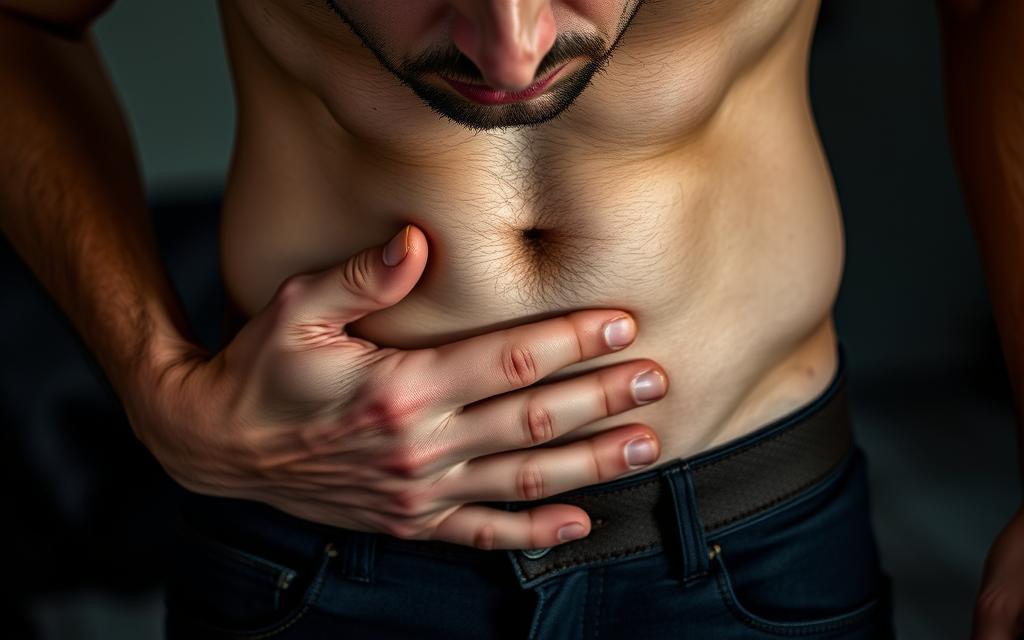Does Minoxidil Cause Erectile Dysfunction? Uncovering the Truth
Minoxidil is a widely used hair loss treatment that has gained popularity for its effectiveness in promoting hair growth. However, concerns have been raised about its potential impact on sexual health, particularly regarding erectile dysfunction causes.
Understanding the relationship between minoxidil and erectile dysfunction is crucial for individuals considering this treatment. While minoxidil is generally considered safe, some users have reported experiencing sexual side effects.
The mechanism of minoxidil as a vasodilator, widening blood vessels in the scalp, is well understood. However, its potential effects on other aspects of health, including sexual function, are less clear. This article aims to explore the available evidence and provide clarity on whether minoxidil can cause erectile dysfunction.
Understanding Minoxidil: Uses and Mechanism of Action
Understanding minoxidil requires delving into its history, mechanism of action, and various applications. Minoxidil is a medication that has been widely used for treating hair loss and was initially developed as an oral medication for hypertension.
What is Minoxidil and Its History
Minoxidil was first introduced as an oral medication to treat high blood pressure. However, during its use, a notable side effect was observed – excessive hair growth. This unexpected outcome led to its application being extended to treating hair loss, particularly androgenetic alopecia.
How Minoxidil Works in the Body
Minoxidil works by widening the hair follicles and prolonging the anagen phase (the active growth phase) of hair growth. When applied topically, it stimulates hair growth by increasing blood flow to the scalp. The exact mechanism of how minoxidil promotes hair growth is not fully understood, but it is believed to involve the opening of potassium channels and possibly an effect on the hair follicle’s calcium levels.
Common Applications and Formulations
Minoxidil is available in various formulations, including topical solutions and foams. It is commonly used to treat androgenetic alopecia (male and female pattern baldness). The topical application is preferred for hair loss treatment due to its localized effect and reduced risk of systemic side effects.
| Formulation | Application | Common Use |
|---|---|---|
| Topical Solution | Applied directly to the scalp | Hair loss treatment |
| Foam | Applied directly to the scalp | Hair loss treatment |
| Oral Tablets | Oral administration | Severe hypertension |
Minoxidil’s versatility in treating both hypertension and hair loss makes it a significant medication with multiple applications. Its use for hair loss treatment has become particularly popular due to its effectiveness in stimulating hair growth.
Does Minoxidil Cause Erectile Dysfunction? Examining the Evidence
Investigating the connection between minoxidil and erectile dysfunction is crucial for understanding the risks associated with this medication. Minoxidil is widely used for treating hair loss, and its potential impact on sexual health has raised concerns among users and healthcare providers.
Clinical Studies and Research Findings
Several clinical studies have explored the potential link between minoxidil and erectile dysfunction. Some studies suggest that minoxidil may not have a significant impact on erectile function, while others indicate a possible association.
A study published in the Journal of Clinical and Aesthetic Dermatology found that among men using minoxidil for hair loss, there was a small incidence of reported erectile dysfunction. However, the study noted that this incidence was not significantly higher than in the general population.
Statistical Data on Reported Cases
Statistical analysis of reported cases provides further insight into the potential link between minoxidil and erectile dysfunction. According to data from the FDA Adverse Event Reporting System (FAERS), there have been reports of erectile dysfunction associated with minoxidil use, although these reports are relatively rare.
| Study | Sample Size | Reported Erectile Dysfunction |
|---|---|---|
| Journal of Clinical and Aesthetic Dermatology | 1000 | 2.5% |
| FAERS Database | N/A | 0.01% of total reports |
Distinguishing Between Correlation and Causation
It’s essential to distinguish between correlation and causation when examining the link between minoxidil and erectile dysfunction. The presence of erectile dysfunction in individuals using minoxidil does not necessarily imply that the medication is the cause.

Further research is needed to fully understand the relationship between minoxidil and erectile dysfunction. Healthcare providers should be consulted if concerns arise.
Potential Mechanisms: How Minoxidil Might Affect Sexual Function
Minoxidil’s effects on sexual function can be attributed to several potential mechanisms that warrant further exploration. Understanding these mechanisms is crucial for assessing the overall impact of minoxidil on sexual health.
Cardiovascular Effects and Blood Flow
Minoxidil is known for its vasodilating properties, which could potentially affect blood flow. Since erectile function is closely linked to blood flow, it’s plausible that minoxidil’s cardiovascular effects might influence erectile health. Research has shown that improved blood flow can enhance erectile function, suggesting a potential positive effect of minoxidil in this context.
Hormonal Interactions and Endocrine System
Another potential mechanism involves hormonal interactions. Minoxidil might influence the endocrine system, although its direct impact on hormone levels is not well-documented. Some studies suggest that changes in blood flow and vascular health could indirectly affect hormone regulation, potentially influencing sexual function.
Psychological Factors and Nocebo Effect
Psychological factors, including the nocebo effect, could also play a significant role. The nocebo effect occurs when individuals experience adverse effects due to their expectation of negative outcomes. If users of minoxidil are concerned about its potential impact on erectile function, this anxiety might contribute to the manifestation of sexual dysfunction.
| Potential Mechanism | Description | Possible Impact on Sexual Function |
|---|---|---|
| Cardiovascular Effects | Minoxidil’s vasodilating properties affecting blood flow | Potential improvement in erectile function due to enhanced blood flow |
| Hormonal Interactions | Possible indirect effects on hormone regulation through vascular health | Variable impact depending on individual hormonal responses |
| Psychological Factors | Nocebo effect and user anxiety about sexual side effects | Potential negative impact on sexual function due to psychological factors |
Understanding these potential mechanisms is essential for a comprehensive assessment of minoxidil’s effects on sexual health. Further research is needed to elucidate the complex interactions between minoxidil and sexual function.
Known Side Effects of Minoxidil
The use of minoxidil, whether topical or oral, can lead to several side effects that users should be aware of. Minoxidil is a vasodilator, and its application, especially in oral form, can have systemic effects.
Common Side Effects of Topical Minoxidil
Topical minoxidil is generally well-tolerated, but it can cause some local side effects. Common issues include:
- Itching or redness at the application site
- Dryness or scaling of the scalp
- Unwanted hair growth in other areas if the solution comes into contact with other parts of the body
Side Effects of Oral Minoxidil
Oral minoxidil, used for more severe cases of hair loss or hypertension, can have more pronounced side effects due to its systemic action. These may include:
- Fluid retention, leading to weight gain
- Changes in heart rate or blood pressure
- Hirsutism (excessive hair growth in women)
Rare but Serious Adverse Reactions
While rare, there are serious adverse reactions associated with minoxidil use. These can include:
- Allergic reactions, such as rash or itching
- Chest pain or irregular heartbeat
- Signs of heart failure, such as shortness of breath or swelling in the legs

It’s essential for users to be aware of these potential side effects and to consult a healthcare provider if they experience any unusual symptoms. Monitoring and managing side effects can help minimize risks associated with minoxidil treatment.
What to Do If You’re Concerned: Practical Advice
Addressing concerns about minoxidil’s potential impact on sexual health requires a comprehensive approach that includes understanding when to seek medical advice. If you’re experiencing any unusual side effects or are worried about the potential link between minoxidil and erectile dysfunction, it’s essential to take proactive steps.
When to Consult a Healthcare Provider
If you’re using minoxidil and notice any changes in your sexual health or experience any concerning side effects, it’s crucial to consult a healthcare provider. They can assess your overall health and provide guidance on whether minoxidil is likely contributing to your symptoms.
Key indicators to consult a healthcare provider include:
- Persistent or severe side effects
- Changes in sexual function or libido
- Concerns about potential interactions with other medications
Alternative Hair Loss Treatments
For those concerned about the potential risks associated with minoxidil, there are alternative hair loss treatments available. These include:
| Treatment | Description |
|---|---|
| Finasteride | An oral medication that slows hair loss and promotes hair growth |
| Low-Level Laser Therapy (LLLT) | A non-invasive treatment that uses low-level laser or light-emitting diodes to stimulate hair growth |
Monitoring and Managing Potential Side Effects
To minimize the risk of side effects, it’s essential to use minoxidil as directed and monitor your body’s response. If you experience any side effects, consider discussing alternative treatments or adjusting your dosage with your healthcare provider.
By being proactive and informed, you can make the best decision for your hair loss treatment and overall health.
Conclusion: The Truth About Minoxidil and Erectile Dysfunction
The relationship between minoxidil and erectile dysfunction has been a topic of concern for many individuals using this medication for hair loss treatment. After examining the available evidence and research findings, it becomes clear that the link between minoxidil and erectile dysfunction is not as straightforward as it may seem.
Clinical studies and statistical data on reported cases suggest that erectile dysfunction is not a commonly associated side effect of minoxidil use. Understanding the potential mechanisms by which minoxidil might affect sexual function, including its cardiovascular effects and hormonal interactions, is crucial. The available data indicate that while minoxidil may have some effects on the body that could theoretically influence erectile function, the incidence of erectile dysfunction in men using minoxidil is not significantly higher than in the general population.
In conclusion, the current evidence does not strongly support a causal relationship between minoxidil use and erectile dysfunction. Individuals concerned about the potential effects of minoxidil on their sexual health should consult a healthcare provider to discuss their specific situation and determine the best course of action. By understanding the causes of erectile dysfunction and the effects of minoxidil, individuals can make informed decisions about their treatment options.
